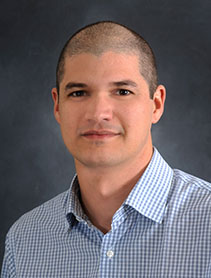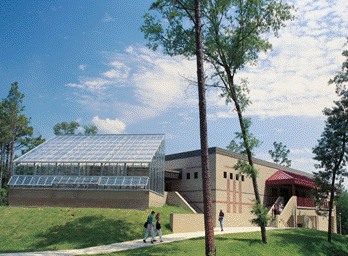
Dr. Peter Cavnar
- Position: HMCSE Associate Dean, Associate Professor
- Department: Biology
- Office Location: Building 58C, Room 104H
- pcavnar@uwf.edu
- Campus: 850.474.2306
Biography
HMCSE's Associate Dean, Biology Department Chair and Associate Professor, Peter Cavnar has a Ph.D. in Biological Sciences -- Cell & Molecular Biology from Florida State University. He also did a four-year Postdoctoral Appointment to the University of Wisconsin-Madison -- Department of Medical Microbiology and Immunology. At UWF, his research seeks to understand how defects in basic cell biology processes will result in disease pathogenesis.
He is specifically interested in cell motility and the cytoskeleton, and cell death and differentiation. He currently uses a model neutrophil cell line to model immunology related diseases, such as defects in the gene HAX1, which results in severe congenital neutropenia (SCN). Neutrophils are key mediators of the innate immune system.
They are the first responders to sites of infection or acute injury, but they also can contribute to the progression of inflammation and the pathogenesis of autoimmune diseases, such as arthritis and lupus. Cavnar is also interested in the cell biology of marine organisms. He is currently developing a model system using comb jellies (Ctenophores) in order to understand the evolutionary origins of wound healing and regeneration.
Cavnar’s research has been published in the Journal of Cellular Biology, Journal of Biological Chemistry, Developmental Cell, and other publications. Cavnar, who joined UWF in 2012, also shares a patent with collaborators utilizing microfluidics to study cell biology. Cavnar teaches Cell Biology, General Biology, Zoology, Biochemistry, and related subjects.
Degrees & Institutions
Ph.D. Biological Sciences/ Cell and Molecular Biology, Florida State University
B.S. Biological Sciences, Florida State University
Research
Cavnar's main research interests focus on investigating the cellular mechanisms that regulate cell motility and adhesion, processes that are important to many physiological and pathological mechanisms including cancer invasion and metastasis, embryonic development, wound healing, and the inflammatory response. Cell motility is an ancient and dynamic process that relies on the spatiotemporal regulation of signaling mechanisms. The central goal in his lab is to understand how organisms coordinate these processes.
Current Courses
- Biology
- Biology Skills
- Molecular Biology Lab
Classes Taught
- Biochemistry Lab
- Cell Biology and Lab
- General Zoology
- General Biology for Non-Majors Lab
Special Interests
When not in the lab or the classroom Dr. Cavnar enjoys to run and is an avid home brewer.
Publications
Lee, Y., Kang, E. B., Kwon, I., Cosio-Lima, L., Cavnar, P. Javan, G. 2016. Cardiac Kinetophagy Coincides with Activation of Anabolic Signaling. Med Sci Sports Exerc. 48(2):219-26.
Yukie Yamahashi*, Peter J. Cavnar*, Laurel Hind, Erwin Berthier, David A. Bennin, David Beebe, and Anna Huttenlocher. 2015. Integrin associated proteins differentially regulate neutrophil polarity and directed migration in 2D and 3D. Biomedical Microdevices. Oct;17(5):100. doi: 10.1007/s10544-015-9998-x *both authors contributed equally to the work
Cavnar P and Inman K. Immunoblotting validation of research antibodies generated against HS1-associated protein X-1 in the human neutrophil model cell line PLB-985. [v2; ref status: indexed,http://f1000r.es/5qc] F1000Research 2015, 4:148 (doi: 10.12688/f1000research.6516.2)
Berthier, E., Guckenberger, D.J., Cavnar, P., Huttenlocher, A., Keller, N.P., Beebe, D.J. 2013. "Kit-On-A-Lid-Assays" for accessible self-contained cell assays. Lab Chip. 13(3):424-31. Cavnar, P.J., Mogen, K*, Berthier, E, Beebe, D.J., and Huttenlocher, A. 2012. The actin regulatory protein HS1 interacts with Arp2/3 and mediates efficient neutrophil chemotaxis. J Biol Chem. 287(30):25466-77.
Keywords: apoptosis, cell motility and adhesion, Hax1, neutrophils, cell biology, molecular biology, immunology, biochemistry, marine biology



